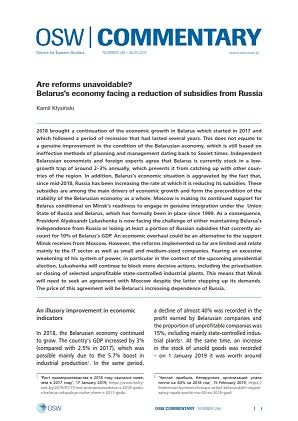Are reforms unavoidable? Belarus’s economy facing a reduction of subsidies from Russia
Are reforms unavoidable? Belarus’s economy facing a reduction of subsidies from Russia
Author(s): Kamil Kłysiński
Contributor(s): Magdalena Klimowicz (Translator)
Subject(s): National Economy, Governance, Economic policy, International relations/trade, Economic development
Published by: OSW Ośrodek Studiów Wschodnich im. Marka Karpia
Keywords: Belarus; reforms; economy; economic policy; economic development; economic relations with Russia;
Summary/Abstract: 2018 brought a continuation of the economic growth in Belarus which started in 2017 and which followed a period of recession that had lasted several years. This does not equate to a genuine improvement in the condition of the Belarusian economy, which is still based on ineffective methods of planning and management dating back to Soviet times. Independent Belarusian economists and foreign experts agree that Belarus is currently stuck in a lowgrowth trap of around 2–3% annually, which prevents it from catching up with other countries of the region. In addition, Belarus’s economic situation is aggravated by the fact that, since mid-2018, Russia has been increasing the rate at which it is reducing its subsidies. These subsidies are among the main drivers of economic growth and form the precondition of the stability of the Belarusian economy as a whole. Moscow is making its continued support for Belarus conditional on Minsk’s readiness to engage in genuine integration under the Union State of Russia and Belarus, which has formally been in place since 1999. As a consequence, President Alyaksandr Lukashenka is now facing the challenge of either maintaining Belarus’s independence from Russia or losing at least a portion of Russian subsidies that currently account for 10% of Belarus’s GDP. An economic overhaul could be an alternative to the support Minsk receives from Moscow. However, the reforms implemented so far are limited and relate mainly to the IT sector as well as small and medium-sized companies. Fearing an excessive weakening of his system of power, in particular in the context of the upcoming presidential election, Lukashenka will continue to block more decisive actions, including the privatisation or closing of selected unprofitable state-controlled industrial plants. This means that Minsk will need to seek an agreement with Moscow despite the latter stepping up its demands. The price of this agreement will be Belarus’s increasing dependence of Russia.
Series: OSW Commentary
- Page Count: 6
- Publication Year: 2019
- Language: English
- Content File-PDF

